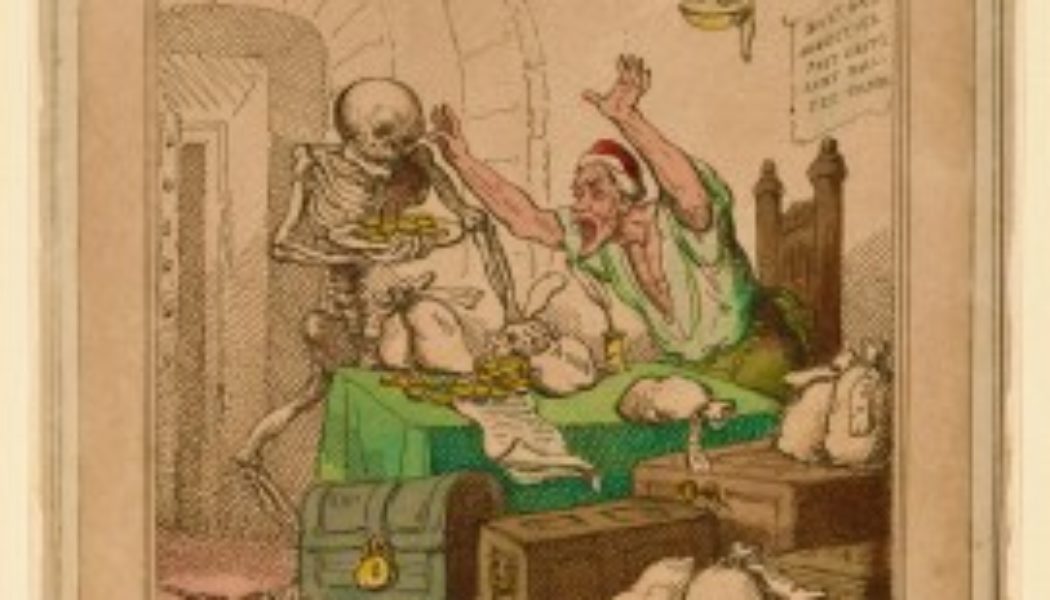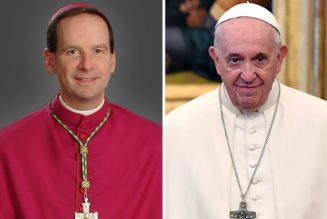The “surplus population” is, in fact, the population that the Constitution is made to protect.

What do Ebenezer Scrooge and Planned Parenthood have in common? The fundamental answer to this question is more than a sentimental appeal to “the Christmas spirit” or a “cheap-shot” at the abortion industry. The answer is found in the writings of the British Anglican Reverend, Thomas Malthus.
In 1798, Malthus wrote “An Essay on the Principle of Population” and worked and reworked the core ideas of this piece over the next several years. He never fundamentally changed from his one big thought: human population increases exponentially while food only increases linearly. Thus, there will always be a tendency in the human race for population to “overpower” food; hence there will be, in the words of Scrooge, a “surplus” population.
Here are Malthus’s own words:
Assuming then my postulata as granted, I say, that the power of population is indefinitely greater than the power in the earth to produce subsistence for man. Population, when unchecked, increases in a geometrical ratio. Subsistence increases only in an arithmetical ratio. A slight acquaintance with numbers will shew the immensity of the first power in comparison to the second. By that law of our nature which makes food necessary to the life of man, the effects of these two unequal powers must be kept equal. This implies a strong and constantly operating check on population from the difficulty of subsistence. This difficulty must fall somewhere and must necessarily be severely felt by a large portion of mankind.[1]
Limited resources for sustaining life provides a “strong and constantly operating check on population;” that is Malthus’s expression. And, relating population to “subsistence” (that which sustains life), Malthus postulates an “immensity of the first power in comparison of the second.” In other words, population overpowers the food necessary to sustain it. An apparently overpowering population is easily called overpopulation; it follows from this position that there must be some people who are expendable – surplus – necessary to do away with to return us to the proper population-subsistence equilibrium.
In Malthus’s defense, his very first goal in offering this worldview was to challenge utopian thought of his day: “if the premises are just, the argument is conclusive against the perfectibility of the mass of mankind.”[2] His “political economy” becomes a kind of mathematization of original sin. And there are areas of his thought which suggest a trust in Providence to bring about the necessary forces to allow for his equilibrium to be met.
Moreover, nowhere does Malthus postulate contraception or abortion, sterilization or euthanasia as a means for eliminating surplus population. If there is an “axe that he grinds” it is in the problem of legislating means to care for the poor: in his time in England, these laws were called, “The Poor Laws.”
The poor laws of England tend to depress the general condition of the poor in these two ways. Their first obvious tendency is to increase population without increasing the food for its support. A poor man may marry with little or no prospect of being able to support a family in independence. They may be said therefore in some measure to create the poor which they maintain, and as the provisions of the country must, in consequence of the increased population, be distributed to every man in smaller proportions, it is evident that the labour of those who are not supported by parish assistance will purchase a smaller quantity of provisions than before and consequently more of them must be driven to ask for support.[3]
Malthus rants so effectively against the problem of overpopulation resulting from elevating the poor that the Poor Laws are amended in the 1830’s to include a much more severe life for those who choose assistance in work houses.[4] Scrooge is the voice of this new Malthusian development when confronted by men seeking donations to help the poor:
“At this festive season of the year, Mr. Scrooge,” said the [one of the gentlemen], taking up a pen, “it is more than usually desirable that we should make some slight provision for the Poor and destitute, who suffer greatly at the present time. Many thousands are in want of common necessaries; hundreds of thousands are in want of common comforts, sir.”
“Are there no prisons?” asked Scrooge.
“Plenty of prisons,” said the gentleman, laying down the pen again.
“And the Union workhouses?” demanded Scrooge. “Are they still in operation?”
“They are. Still,” returned the gentleman, “I wish I could say they were not.”
“The Treadmill and the Poor Law are in full vigour, then?” said Scrooge.
“Both very busy, sir.”
“Oh! I was afraid, from what you said at first, that something had occurred to stop them in their useful course,” said Scrooge. “I’m very glad to hear it.”
“Under the impression that they scarcely furnish Christian cheer of mind or body to the multitude,” returned the gentleman, “a few of us are endeavouring to raise a fund to buy the Poor some meat and drink, and means of warmth. We choose this time, because it is a time, of all others, when Want is keenly felt, and Abundance rejoices. What shall I put you down for?”
“Nothing!” Scrooge replied.
“You wish to be anonymous?”
“I wish to be left alone,” said Scrooge. “Since you ask me what I wish, gentlemen, that is my answer. I don’t make merry myself at Christmas and I can’t afford to make idle people merry. I help to support the establishments I have mentioned: they cost enough: and those who are badly off must go there.”
“Many can’t go there; and many would rather die.”
“If they would rather die,” said Scrooge, “they had better do it, and decrease the surplus population.”[5]
Perhaps it is unfair to say that Malthus would himself have had such a callous expression (and perhaps not on Christmas or not with his own employee Cratchit, even if had one); nevertheless, there is very little difference between the theoretical sentiments expressed over and over by Malthus in regard to the Poor Laws and those professed by Scrooge. I am not the first to make this connection. Matthew Caruchet, in quoting the same passage from Dickens, also notes that “The Poor Law is a reference to the popular economic theories of Thomas Malthus.”[6]
But is this Malthusian principle also linked to Planned Parenthood? According to George Grant, a biographer of Margaret Sanger (the founder of Planned Parenthood), the answer is unambiguously yes. Detailing her escape from the US during a time when her publications may have put her in federal prison for breaking the Comstock laws, Sanger found herself in England.
Grant writes, “As soon as she came ashore, Margaret began to make contact with the various radical groups of Britain. She began attending socialist lectures on Nietzsche’s moral relativism, anarchist lectures on Kropotkin’s subversive pragmatism, and communist lectures on Bakunin’s collectivistic rationalism. But she was especially interested in developing close ties with the Malthusians.”[7]
Grant explains how the path could go from Malthus’s pen to the neo-Malthusian world of Sanger. “Malthus’s disciples—the Malthusians and the NeoMalthusians-believed that if Western civilization were to survive, the physically unfit, the materially poor, the spiritually diseased, the racially inferior, and the mentally incompetent had to somehow be suppressed and isolated perhaps even eliminated. And while Malthus was forthright in recommending plague, pestilence, and petrification, his disciples felt that the subtler and more ‘scientific’ approaches of education, contraception, sterilization, and abortion were more practical and acceptable ways to ease the pressures of the supposed overpopulation.”[8]
And Margaret Sanger was “all in,” as they say.
Not surprisingly, Margaret immediately got on the Malthusian bandwagon. She was not philosophically inclined, nor was she particularly adept at political, social, or economic theory, but she did recognize in the Malthusians a kindred spirit and a tremendous opportunity. She was also shrewd enough to realize that her notions of radical socialism and sexual liberation would never have the popular support necessary to usher in the revolution without some appeal to altruism and intellectualism. She needed somehow to capture the moral and academic “high ground.” Malthusianism, she thought, just might be the key to that ethical and intellectual posture. If she could argue for birth control using the scientifically verified threat of poverty, sickness, racial tension, and overpopulation as its backdrop, then she would have a much better chance of making her case. So she began to absorb as much of the Malthusian dogma as she could. Margaret also immersed herself in the teachings of each of the Malthusian offshoots. If a little bit of something is a good thing, then a lot is even better. There was phrenology, Binetism, and Craniometricism. There was Oneidianism, Polygenesis, Recapitulationism, Lambrosianism, Hereditarianism, Freudianism, and Neotenism. From each group she picked Up a few popular slogans and concepts that would permanently shape her crusade. . But Eugenics left the most lasting impression on the malleable mold of her nascent worldview of radicalism. Eugenics was perhaps the most revolutionary of the pseudo-sciences spawned by Malthusianism.[9]
Thus, the “birth” of Planned Parenthood stems from the exact same theoretical framework as Scrooge: it stems from the thought of Thomas Malthus.
It is also not hard, furthermore, to hear echoes of Malthus in contemporary environmental politics. The mantra goes that, as long as we reduce the population, we can reduce carbon emission. After all, the growth of population seems to excede the means for controlling the Carbon Dioxide: another Malthusian catastrophe awaits . . .
Conservatives (or classical liberals) in the economic field should also beware of the influence of Malthus on their thought. While Malthus can be heralded as an important first thinker in political economics going beyond what Thomas Sowell would call “1st stage thinking,” his reduction of the human person to merely an eating and reproducing thing – and the awful legacy he now has – remind us of the need to see the whole person in any type of economic or political mathematicization of social realities. Conservatism must remember that a political economy which is open to human flourishing for all is better than one which focuses only on the flourishing of a select few. And whereas we can debate this or that government handout to the poor, we must not be afraid of the reality that helping those in need means there are more people in the world. Rather than focus on the ill-effects of some government programs, we need to find better solutions to problems that lead to poverty and ignorance.
In short, the dangerous legacy of Thomas Malthus is an important problem for American thought. After all, we are not done seeing the political influence of Planned Parenthood, the socialist sympathies worked up over a misinterpretation of Bob Cratchit, and the environmentalist lobbies. What, then, is a modern American thinker to say in response to the spirit of Malthus that guides much of political economic proposals today?
What, in short, is the Constitution’s position on Malthusian ideals?
First, it is helpful to remember that the Constitution, written in the 1780’s, precedes the essay on population published in 1798. In no way, then, could the essay be said to be a core part of any of the founders’ intentions.
Second, it is important to recall the most important principle of the Constitution’s goal: the “checks and balances” on political power which are ordered, ultimately, to removing the chances for power to remain in the hands of the very few against the good of the many; the American experiment is born out of the ashes of monarchy-seen-as-tyranny.
Federalist 51 famously underscores the goal to “lay a due foundation for that separate and distinct exercise of the different powers of government, which to a certain extent is admitted on all hands to be essential to the preservation of liberty.” And in such a government ordered against supreme power usurpation, it is clear that “you must first enable the government to control the governed; and in the next place oblige it to control itself.”[10]
Thus, it is fundamental to any interpretation of the Constitution that an ideology which defined some people as “surplus” or “expendable” would necessarily be against the goals of liberty enshrined in its principles. Such a view could only lead (as it has done in the case of neo-Malthusian population control measures) to a subtle or overt form of tyranny of the ones in power over those who are “surplus.”
Third, the Bill of Rights makes clear that the dignity of the human person has political force greater than arbitrary government imposition. Rights are given to religious convictions, possible militia, the accused, and even the condemned. States get all rights not enumerated to federal government. And the ninth amendment suggests that individual rights are of fundamental importance even when not enumerated.
This means, again, that if an ideology moves through scientific calculation to put an arbitrary view of social well-being above basic rights of the individual, it goes against the Constitution.
Fourth, American history itself bears witness to the power of this constitutional protection of the marginal. Slavery is abolished and segregation ended both in dramatic fashion (both highlighted by key American heroes, Lincoln and king, who turned to the founding documents for ultimate clarity in their interpretation of their times); a similar case – though of less violence in conflict – could be made for Anthony and women suffragists. We have seen laws protect the handicapped and, with the overturn of Roe v. Wade, a sense that laws should protect the unborn.
All of these historical developments show that the force of constitutional law through the centuries moves toward greater and greater protection of marginal peoples, slowly rejecting the possibility that any could be considered surplus.
Fifth, from a religious standpoint, the Constitution understands original sin better than Malthus does. It is not sufficient to say that population’s propensity to overpower food constitutes a necessary proof of the impossibility of utopia. After all, humans are free and can choose actions that order procreation; moreover, they are intelligent and can find new ways to produce goods for subsistence. Perhaps more important, the prelapsarian command from God in the Judeo-Chrsitian tradition is to be fruitful and multiply – procreation could not be the root of original sin!
On the other hand the Federalist principle (as we have already seen) that men are not angels and must govern each other and themselves is much closer to the truth of the theology of original sin. Men desire to overpower one another; their greed and lust to dominate makes their role in government important but wounded. Indeed, this is God’s claim about the effects of original sin: “Your desire will be for your husband, and he will rule over you.”[11] The relations of man and woman are now subject to disordered power relations. This will be the face of all relations, as soon Cain will kill Abel, and violence will spread until the flood.
Thus, for the Christian claiming Malthusian principles in political economy, the Constitution provides a check by faith: the proper starting point for original sin is the balance of power, not the balance of population.
The preceding analysis leads to key consequences for our time. Primarily, the Constitution is for the person and against population control. This means that laws and policies that are based on an inversion of the hierarchy of personal rights over population demography can be challenged on Constitutional grounds. Conservatives can appeal to an analysis of Malthus in contrast to the principles of the Founders to show that America is fundamentally pro-procreation and not contra-conception.
Thus, as we watch the modern world invent more and more strange ways to crush the individual under the weight of government control, government intrusion, and government manipulation of the person for its utopian vision, the Constitution remains a viable antidote to these forces, and a proper understanding of its inherent critique of Malthusian thought remains an effective guide for battling proposals and legislative ideas that run counter to the dignity of the human person.
In sum, then, we can say that the surplus population is the one the Constitution is made to protect. The idea of the surplus population is one which, from the standpoint of viewer, can almost never refer to oneself. Who numbers himself among the expendable? The Constitution, with its fabric oriented toward protecting rights and preventing usurpation of power, is profoundly geared toward handling the modern delusions of population-crises-turned-demagoguery. An imaginative conservative should be equipped to turn all of the current theories of power to destroy in the name of population or carbon output into a version or subversion of the erroneous political economy of Thomas Malthus. In so doing we can say (with the Constitution and – I guess – Dickens himself), “Bah Humbug!” to anyone who would destroy life, turn away from the marginal, or sterilize the world in the name of scarce resources.
Notes:
[1] Thomas Malthus, An Essay on the Principle of Population (London: St. Paul’s, 1798), Ch. 1.
[2] Malthus, Essay, Ch. 1.
[3] Malthus, Essay, Ch. 5.
[4] web.archive.org/web/20070720200312/http://www2.rgu.ac.uk/publicpolicy/introduction/historyf.htm
[5] Charles Dickens, A Christmas Carol, Stave 1.
[6] www.opportunityinstitute.org/blog/post/a-christmas-carol-sending-the-poor-to-prison
[7] George Grant, Killer Angel: A Biography of Planned Parenthood’s Founder, Margaret Sanger (TN: Ars Vitae Press, 1995) op. cit. famguardian.org/Subjects/Life/Abortion/KillerAngel.pdf, pg. 49.
[8] Grant, Killer Angel, 51-52.
[9] Grant, Killer Angel, 53.
[10] The Federalist Papers, 51.
[11] Gen 3:16.
The Imaginative Conservative applies the principle of appreciation to the discussion of culture and politics—we approach dialogue with magnanimity rather than with mere civility. Will you help us remain a refreshing oasis in the increasingly contentious arena of modern discourse? Please consider donating now.
The featured image is “Death and the Miser” (20 December 1801) by Thomas Rowlandson. This file is made available under the Creative Commons CC0 1.0 Universal Public Domain Dedication, courtesy of Wikimedia Commons.











